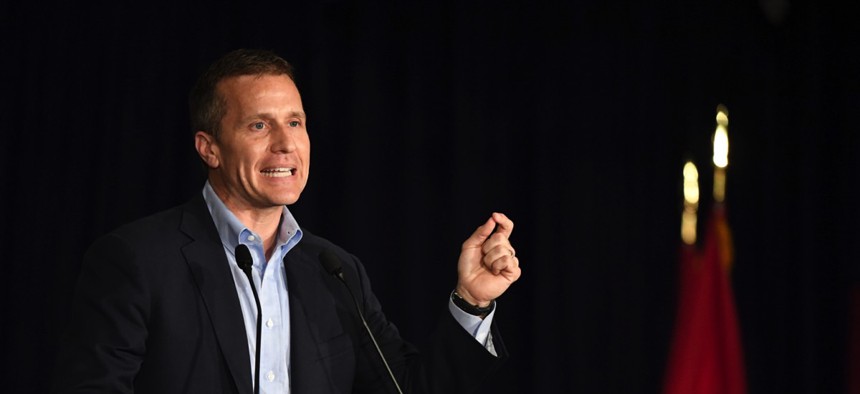Missouri Will Finally Have A State-Level Prescription Drug Monitoring Program

Missouri Gov. Eric Greitens.
Gov. Eric Greitens announced the details of his program—which notably neither doctors, nor pharmacists will be able to access—in an executive order announcement on Monday.
Missouri will no longer be the only U.S. state without a prescription drug monitoring program.
In a surprise announcement on Monday, Republican Gov. Eric Greitens sidestepped the GOP-controlled legislature to create his own program by executive order. A previous effort to introduce a drug monitoring system failed to garner enough votes in the state’s House of Representatives before that body adjourned in May of this year. Past attempts stumbled in part because of concerns from privacy advocates.
Now, Greitens has said he’s through with waiting for state lawmakers to make a move on this issue.
“There are too many families that have had to deal with this,” Greitens said during the announcement event, which was held at Express Scripts, a St. Louis County-based pharmaceutical provider. “We have to look this problem square in the eye.”
Under the governor’s plan, the state Department of Health and Senior Services will enter into a partnership with Express Scripts and other pharmacy benefit management companies to monitor doctor and pharmacy data and flag any activity that might indicate that schedule II substances are being inappropriately prescribed or dispensed. That information will remain confidential.
And, notably, doctors and pharmacists will not have access to the database.
At least one Missouri lawmaker made it clear that he disapproves of the governor’s methods:
And, U.S. Sen. Claire McCaskill of Missouri—who earlier this year called upon Greitens to bring lawmakers together for a special legislative session to vote on the failed prescription drug monitoring bill—praised the governor’s initiative, but offered concerns that his executive order doesn’t go far enough.
“While I certainly welcome the governor’s attention to this crisis, I have serious questions about how meaningful this action will be if doctors writing prescriptions—and pharmacists filling those prescriptions—don’t have access to this database," McCaskill told the St. Louis Post-Dispatch.
Research on the effectiveness of state-level prescription drug monitoring programs does indicate that prescribers are important stakeholders to include in these types of initiatives. One study, released earlier this year in Health Affairs, found that states that adopted mandates that require prescribers to register with or use these databases saw a 9-10 percent reduction in the use of schedule II opioids.
Quinn Libson is a Staff Correspondent for Government Executive’s Route Fifty based in Washington, D.C..
NEXT STORY: A Former Whaling and Textiles Hub in New England Seeks Regeneration






